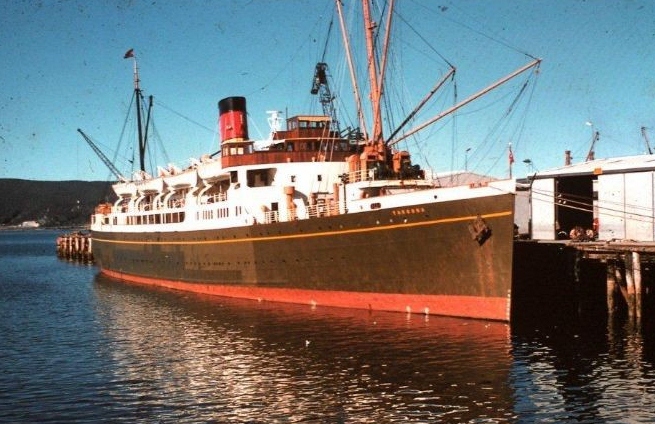25/4 marks ANZAC day in Australia and New Zealand, a day where we commemorate our soldiers who have fought in wars since WWI. The date is marked by the landing of troops at Gallipoli in Dardanelles strait.
Over the years the ferries that have sailed the strait were not immune to these wars. Ferries such as Nairana and Taroona played an important part in WWI and WWII.
The ferries involvement was:
1914-1918 Oonah, Rotomahana and Loongana maintained busy schedules during the war years

1918 Coogee was requisitioned as mine sweeper

1917 Nairana was requisitioned by the Royal Navy as she was being built at William Denny and Bros, Dumbarton Scotland for Huddart Parker’s Bass Strait trade. She was converted to a Campania sea plane carrier and was used in the North Russia Campaign sailing in the white sea in support of the British intervention in the Russian Civil War. In 1919 she was returned to William Denny Bros who completed her to Original design and delivered her in 1921 to Huddart Parker.

1940 Zealandia, not exclusively a ferry for Tasmania, but did serve on the Hobart-Sydney route for some time. She was requisitioned by Australian forces as a troop ship to sail between Sydney, Darwin and Singapore. She was at Anchor in Darwin harbour when on 19/2/1940 the Japanese attack the city. Zealandia was bombed and sunk in the harbor.

1942 Taroona requisitioned by New Zealand (Tasmanian steamers was a joint venture between ZN and AUS ownership) forces for a trip to Suva.

1942-1946 Soon after Taroona returned from New Zealand, she was again requisitioned, but by Australian forces as a fast troop ship. She was used to sail between Townsville in North Queensland to Port Moresby, Papua New Guinea.
During her first trip to Port Moresby she carried 480 troops and supplies; on leaving Moresby she ran aground on a reef at the entrance where she remained for three days, helpless hard and fast aground. All attempts to refloat her using both engines and the assistance of navy vessels proved useless. The situation became serious when on several occasions Japanese bombers swept in to attack the Seven Mile Aerodrome outside Port Moresby. Why they failed to attack Taroona remains a mystery. Finally aided by three naval vessels, she shook herself free.
In her war time career she traveled 204,535 miles and carried 93,432 troops. Although frequently under fire during her ninety-four trips she remained unscathed.

1939-1945 Nairana maintain schedule across bass Strait, many years by herself, fitted with mine sweepers and blacked out windows carrying Civilian and troops heading to war.
Lest we forget.
Ferries under the RAN
1977-1995 HMAS Jervis Bay was the Bass Strait ferry Australian Trader. She sailed the Line Melbourne-Devonport and Sydney-Devonport from 1969 to 1977. She was sold to the RAN in 1977, renamed HMAS Jervis bay. She was mainly a training ship but was involved in a few missions, one to Africa. After her military service she was sold to Med Link Lines of Greece.

1999-2001 HMAS Jervis Bay (II) Although only a brief stint as a ferry for TT-Line, Incat o46 was known as “Tas Cat” in 1997 as a trial to see if Incat catamarans would be successful on the Strait. in 1999 she was charted to the RAN and was active in the East Timor crisis sailing from Darwin to Dili.
![Dec 4, 1999; HMAS JERVIS BAY [II] in Dili Harbour - Photo … | Flickr](https://live.staticflickr.com/5188/5674339539_54e002fbed_b.jpg)
Some further reading
https://en.wikipedia.org/wiki/SS_Taroona
https://en.wikipedia.org/wiki/HMS_Nairana_(1917)
https://en.wikipedia.org/wiki/SS_Loongana
https://en.wikipedia.org/wiki/SS_Zealandia_(1910) Hobart – Sydney
https://en.wikipedia.org/wiki/Huddart_Parker
https://en.wikipedia.org/wiki/Union_Company
